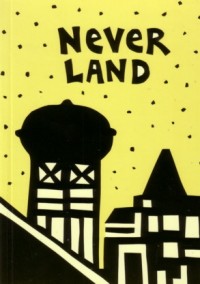 Home > CR Reviews
Home > CR Reviews Neverland
posted August 31, 2009
Neverland
posted August 31, 2009

 Creator:
Creator: Dave Kiersh
Publishing Information: Bodega, softcover, 32 pages, 2008
Ordering Numbers: 9780977767953 (ISBN13)
In a manner reminiscent of Richard Sala, the cartoonist Dave Kiersh has carved out a very specific, post-juvenile world for exploration. Through Kiersh's comics we experience a stale, suburban, late 20th Century America through which roar teenage boys and buxom bad girls, a world exactly like the one we might have imagined in the fifth grade for the pretty babysitter that let us share a cigarette. It's shopping malls instead of hidden forests, sweaters instead of torn dresses and switchblades instead of hatchets, but the sense of danger, of running a gauntlet for some barely conceivable reason, remains.
Despite an almost oppressive art approach featuring dense patterns and clutter,
Never Land has a much more genial tone than Kiersh usually brings to such a project. The difference seems to me to arise from a disconnect between the setting and our hero's desire to negotiate through it somehow. We meet our much more passive than usual Kiersh hero as he pushes against a status quo that seems to give way to pressure rather than allowing anyone to shove off or build momentum. He's trapped not by bars but by the stifling comfort of the life into which he's slipped. It's easier to fantasize than do anything constructive, and tempting to let the days slip together. The quiet buildings and tree-lines designed to diminish highway noise seem more sad than an affront, and there's a creepy danger in the way the neighborhood avoids dramatic confrontation before death. Even our hero's fantasies -- and the one here plays on for a humorously long time -- seem disjointed and frustrating. Still, in the last few pages, he fairly wrestles his dream to the ground and uses the sensation of flight at his dream's core to build a strategy that helps him to seize control of his environment rather than retreat from it, if only one small change at a time. I'm not sure if the last few pages convince, but had he gone the other way with it,
Never Land would have been brutally disheartening.
Although unsatisfying as a narrative, Kiersh fans might enjoy this one for the left-handed glance at his comics through a different set of storytelling lens. It's almost like he's taking the set-ups from one of his own stories and having it comment on an artistic goal for once, something closer to his own experience. What's suggested is that reliving a certain set of emotions through art doesn't have to be about repeating a specific life experience, but retaining one's mastery over a specific, horrible outcome.


